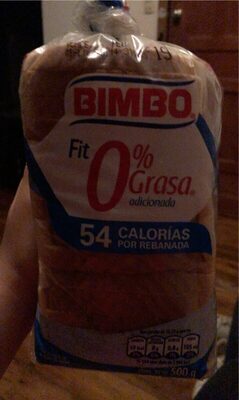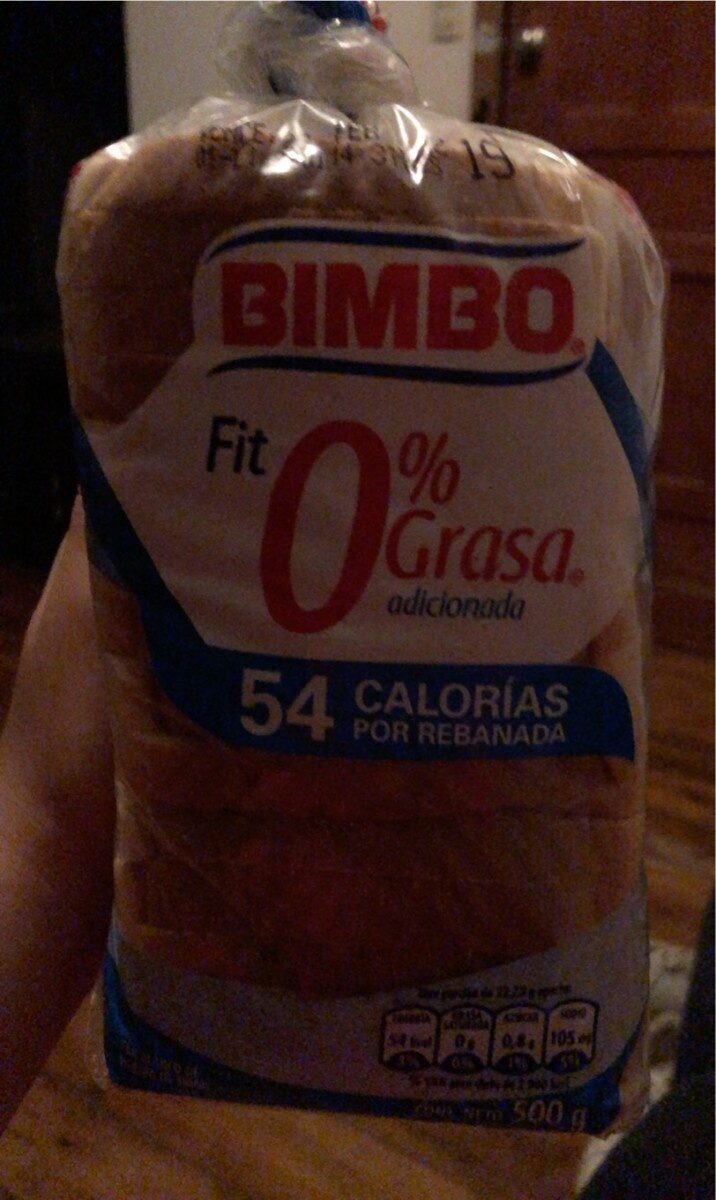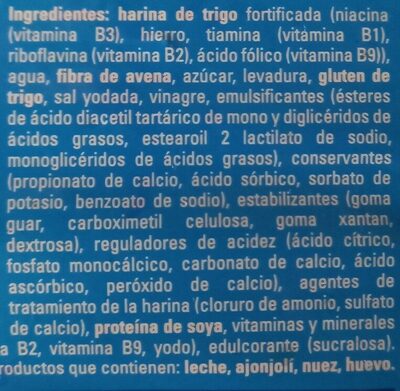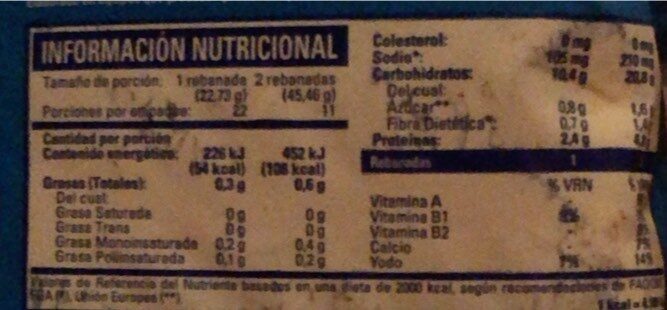Help us make food transparency the norm!
As a non-profit organization, we depend on your donations to continue informing consumers around the world about what they eat.
The food revolution starts with you!
pan bimbo fit 0% grasa
pan bimbo fit 0% grasa
This product page is not complete. You can help to complete it by editing it and adding more data from the photos we have, or by taking more photos using the app for Android or iPhone/iPad. Thank you!
×
Barcode: 7441029500356 (EAN / EAN-13)
Categories: Plant-based foods and beverages, Plant-based foods, Cereals and potatoes, Breads
Countries where sold: Costa Rica
Matching with your preferences
Health
Ingredients
-
50 ingredients
Fortified wheat flour (niacin (vitamin b3), iron, thiamine (vitamin b1), riboflavin (vitamin b2), folic acid (vitamin b9)), water, oat fiber, sugar, yeast, wheat gluten, iodine salt, vinegar, emulsifiers (mono tartaric diacetyl acid esters and fatty acid diglycerides, stearoil 2 sodium lactilate, fatty acid monoglycerides), preservatives (calcium propionate, sorbic acid, potassium sorbate, potassium sorbate , sodium benzoate), stabilizers (guar gum, carboxymethyl cellulose, xantan gum, dextrose), acidity regulators (citric acid, monocalcium phosphate, calcium carbonate, ascorbic acid, calcium peroxide), flour treatment agents (ammonium chloride, calcium sulfate), soy protein, vitamins and minerals to b2, vitamin b9, iodine), sweetener (sucralose), roducts containing: milk, sesame, nutAllergens: Eggs, Gluten, Milk, Nuts, Sesame seeds
Food processing
-
Ultra processed foods
Elements that indicate the product is in the 4 - Ultra processed food and drink products group:
- Additive: E170 - Calcium carbonates
- Additive: E412 - Guar gum
- Additive: E466 - Sodium carboxy methyl cellulose
- Additive: E481 - Sodium stearoyl-2-lactylate
- Additive: E955 - Sucralose
- Ingredient: Dextrose
- Ingredient: Emulsifier
- Ingredient: Glucose
- Ingredient: Gluten
- Ingredient: Sweetener
Food products are classified into 4 groups according to their degree of processing:
- Unprocessed or minimally processed foods
- Processed culinary ingredients
- Processed foods
- Ultra processed foods
The determination of the group is based on the category of the product and on the ingredients it contains.
Additives
-
E170 - Calcium carbonates
Calcium carbonate: Calcium carbonate is a chemical compound with the formula CaCO3. It is a common substance found in rocks as the minerals calcite and aragonite -most notably as limestone, which is a type of sedimentary rock consisting mainly of calcite- and is the main component of pearls and the shells of marine organisms, snails, and eggs. Calcium carbonate is the active ingredient in agricultural lime and is created when calcium ions in hard water react with carbonate ions to create limescale. It is medicinally used as a calcium supplement or as an antacid, but excessive consumption can be hazardous.Source: Wikipedia
-
E200 - Sorbic acid
Sorbic acid: Sorbic acid, or 2‚4-hexadienoic acid, is a natural organic compound used as a food preservative. It has the chemical formula CH3-CH-4CO2H. It is a colourless solid that is slightly soluble in water and sublimes readily. It was first isolated from the unripe berries of the Sorbus aucuparia -rowan tree-, hence its name.Source: Wikipedia
-
E202 - Potassium sorbate
Potassium sorbate (E202) is a synthetic food preservative commonly used to extend the shelf life of various food products.
It works by inhibiting the growth of molds, yeast, and some bacteria, preventing spoilage. When added to foods, it helps maintain their freshness and quality.
Some studies have shown that when combined with nitrites, potassium sorbate have genotoxic activity in vitro. However, potassium sorbate is generally recognized as safe (GRAS) by regulatory authorities.
-
E211 - Sodium benzoate
Sodium benzoate: Sodium benzoate is a substance which has the chemical formula NaC7H5O2. It is a widely used food preservative, with an E number of E211. It is the sodium salt of benzoic acid and exists in this form when dissolved in water. It can be produced by reacting sodium hydroxide with benzoic acid.Source: Wikipedia
-
E282 - Calcium propionate
Calcium propanoate: Calcium propanoate or calcium propionate has the formula Ca-C2H5COO-2. It is the calcium salt of propanoic acid.Source: Wikipedia
-
E330 - Citric acid
Citric acid is a natural organic acid found in citrus fruits such as lemons, oranges, and limes.
It is widely used in the food industry as a flavor enhancer, acidulant, and preservative due to its tart and refreshing taste.
Citric acid is safe for consumption when used in moderation and is considered a generally recognized as safe (GRAS) food additive by regulatory agencies worldwide.
-
E341 - Calcium phosphates
Calcium phosphate: Calcium phosphate is a family of materials and minerals containing calcium ions -Ca2+- together with inorganic phosphate anions. Some so-called calcium phosphates contain oxide and hydroxide as well. They are white solids of nutritious value.Source: Wikipedia
-
E341i - Monocalcium phosphate
Calcium phosphate: Calcium phosphate is a family of materials and minerals containing calcium ions -Ca2+- together with inorganic phosphate anions. Some so-called calcium phosphates contain oxide and hydroxide as well. They are white solids of nutritious value.Source: Wikipedia
-
E412 - Guar gum
Guar gum (E412) is a natural food additive derived from guar beans.
This white, odorless powder is valued for its remarkable thickening and stabilizing properties, making it a common ingredient in various food products, including sauces, dressings, and ice creams.
When used in moderation, guar gum is considered safe for consumption, with no known adverse health effects.
-
E466 - Sodium carboxy methyl cellulose
Carboxymethyl cellulose: Carboxymethyl cellulose -CMC- or cellulose gum or tylose powder is a cellulose derivative with carboxymethyl groups --CH2-COOH- bound to some of the hydroxyl groups of the glucopyranose monomers that make up the cellulose backbone. It is often used as its sodium salt, sodium carboxymethyl cellulose.Source: Wikipedia
-
E481 - Sodium stearoyl-2-lactylate
Sodium stearoyl lactylate: Sodium stearoyl-2-lactylate -sodium stearoyl lactylate or SSL- is a versatile, FDA approved food additive used to improve the mix tolerance and volume of processed foods. It is one type of a commercially available lactylate. SSL is non-toxic, biodegradable, and typically manufactured using biorenewable feedstocks. Because SSL is a safe and highly effective food additive, it is used in a wide variety of products ranging from baked goods and desserts to pet foods.As described by the Food Chemicals Codex 7th edition, SSL is a cream-colored powder or brittle solid. SSL is currently manufactured by the esterification of stearic acid with lactic acid and partially neutralized with either food-grade soda ash -sodium carbonate- or caustic soda -concentrated sodium hydroxide-. Commercial grade SSL is a mixture of sodium salts of stearoyl lactylic acids and minor proportions of other sodium salts of related acids. The HLB for SSL is 10-12. SSL is slightly hygroscopic, soluble in ethanol and in hot oil or fat, and dispersible in warm water. These properties are the reason that SSL is an excellent emulsifier for fat-in-water emulsions and can also function as a humectant.Source: Wikipedia
-
E516 - Calcium sulphate
Calcium sulfate: Calcium sulfate -or calcium sulphate- is the inorganic compound with the formula CaSO4 and related hydrates. In the form of γ-anhydrite -the anhydrous form-, it is used as a desiccant. One particular hydrate is better known as plaster of Paris, and another occurs naturally as the mineral gypsum. It has many uses in industry. All forms are white solids that are poorly soluble in water. Calcium sulfate causes permanent hardness in water.Source: Wikipedia
-
E955 - Sucralose
Sucralose: Sucralose is an artificial sweetener and sugar substitute. The majority of ingested sucralose is not broken down by the body, so it is noncaloric. In the European Union, it is also known under the E number E955. It is produced by chlorination of sucrose. Sucralose is about 320 to 1‚000 times sweeter than sucrose, three times as sweet as both aspartame and acesulfame potassium, and twice as sweet as sodium saccharin. Evidence of benefit is lacking for long-term weight loss with some data supporting weight gain and heart disease risks.It is stable under heat and over a broad range of pH conditions. Therefore, it can be used in baking or in products that require a long shelf life. The commercial success of sucralose-based products stems from its favorable comparison to other low-calorie sweeteners in terms of taste, stability, and safety. Common brand names of sucralose-based sweeteners are Splenda, Zerocal, Sukrana, SucraPlus, Candys, Cukren, and Nevella. Canderel Yellow also contains sucralose, but the original Canderel and Green Canderel do not.Source: Wikipedia
Ingredients analysis
-
May contain palm oil
Ingredients that may contain palm oil: E481
-
Non-vegan
Non-vegan ingredients: EggSome ingredients could not be recognized.
We need your help!
You can help us recognize more ingredients and better analyze the list of ingredients for this product and others:
- Edit this product page to correct spelling mistakes in the ingredients list, and/or to remove ingredients in other languages and sentences that are not related to the ingredients.
- Add new entries, synonyms or translations to our multilingual lists of ingredients, ingredient processing methods, and labels.
If you would like to help, join the #ingredients channel on our Slack discussion space and/or learn about ingredients analysis on our wiki. Thank you!
-
Vegetarian status unknown
Unrecognized ingredients: Iron, Thiamin, Thiamin, Folic acid, Folic acid, es:esteres-de-acido-diacetil-tartarico-de-mono-y-digliceridos-de-acidos-grasos, es:monogliceridos-de-acidos-grasos, es:goma-xantan, es:peroxido-de-calcio, es:vitaminas-y-minerales-a-b2, Folic acid, Iodine, es:roductos-que-contienenSome ingredients could not be recognized.
We need your help!
You can help us recognize more ingredients and better analyze the list of ingredients for this product and others:
- Edit this product page to correct spelling mistakes in the ingredients list, and/or to remove ingredients in other languages and sentences that are not related to the ingredients.
- Add new entries, synonyms or translations to our multilingual lists of ingredients, ingredient processing methods, and labels.
If you would like to help, join the #ingredients channel on our Slack discussion space and/or learn about ingredients analysis on our wiki. Thank you!
-
Details of the analysis of the ingredients
We need your help!
Some ingredients could not be recognized.
We need your help!
You can help us recognize more ingredients and better analyze the list of ingredients for this product and others:
- Edit this product page to correct spelling mistakes in the ingredients list, and/or to remove ingredients in other languages and sentences that are not related to the ingredients.
- Add new entries, synonyms or translations to our multilingual lists of ingredients, ingredient processing methods, and labels.
If you would like to help, join the #ingredients channel on our Slack discussion space and/or learn about ingredients analysis on our wiki. Thank you!
: Harina de trigo fortificada (niacina (vitamina B3), hierro, tiamina (vitamina B1), riboflavina (vitamina B2), ácido fólico (vitamina B9)), agua, fibra de avena, azúcar, levadura, gluten de trigo, sal yodada, vinagre, emulsificantes (ésteres de ácido diacetil tartárico de mono- y diglicéridos de ácidos grasos, estearoil 2 lactilato de sodio, monoglicéridos de ácidos grasos), conservantes (propionato de calcio, ácido sórbico, sorbato de potasio, benzoato de sodio), estabilizantes (goma guar, carboximetil celulosa, goma xantan, dextrosa), reguladores de acidez (ácido cítrico, fosfato monocálcico, carbonato de calcio, ácido ascórbico, peróxido de calcio), agentes de tratamiento de la harina (cloruro de amonio, sulfato de calcio), proteína de soya, vitaminas y minerales a B2, vitamina B9, yodo, edulcorante (sucralosa), roductos que contienen, ajonjolí, nuez, huevo- Harina de trigo fortificada -> en:fortified-wheat-flour - vegan: yes - vegetarian: yes - ciqual_proxy_food_code: 9410 - percent_min: 4.54545454545455 - percent_max: 100
- niacina -> en:e375 - vegan: maybe - vegetarian: maybe - percent_min: 0.909090909090909 - percent_max: 100
- vitamina B3 -> en:e375 - vegan: maybe - vegetarian: maybe - percent_min: 0.909090909090909 - percent_max: 100
- hierro -> en:iron - percent_min: 0 - percent_max: 50
- tiamina -> en:thiamin - percent_min: 0 - percent_max: 33.3333333333333
- vitamina B1 -> en:thiamin - percent_min: 0 - percent_max: 33.3333333333333
- riboflavina -> en:e101 - vegan: maybe - vegetarian: yes - percent_min: 0 - percent_max: 25
- vitamina B2 -> en:e101 - vegan: maybe - vegetarian: yes - percent_min: 0 - percent_max: 25
- ácido fólico -> en:folic-acid - percent_min: 0 - percent_max: 20
- vitamina B9 -> en:folic-acid - percent_min: 0 - percent_max: 20
- niacina -> en:e375 - vegan: maybe - vegetarian: maybe - percent_min: 0.909090909090909 - percent_max: 100
- agua -> en:water - vegan: yes - vegetarian: yes - ciqual_food_code: 18066 - percent_min: 0 - percent_max: 50
- fibra de avena -> en:oat-fibre - vegan: yes - vegetarian: yes - ciqual_food_code: 9310 - percent_min: 0 - percent_max: 33.3333333333333
- azúcar -> en:sugar - vegan: yes - vegetarian: yes - ciqual_proxy_food_code: 31016 - percent_min: 0 - percent_max: 2.2
- levadura -> en:yeast - vegan: yes - vegetarian: yes - percent_min: 0 - percent_max: 2.2
- gluten de trigo -> en:wheat-gluten - vegan: yes - vegetarian: yes - percent_min: 0 - percent_max: 2.2
- sal yodada -> en:iodised-salt - vegan: yes - vegetarian: yes - ciqual_food_code: 11058 - percent_min: 0 - percent_max: 2.2
- vinagre -> en:vinegar - vegan: yes - vegetarian: yes - ciqual_food_code: 11018 - percent_min: 0 - percent_max: 2.2
- emulsificantes -> en:emulsifier - percent_min: 0 - percent_max: 2.2
- ésteres de ácido diacetil tartárico de mono- y diglicéridos de ácidos grasos -> es:esteres-de-acido-diacetil-tartarico-de-mono-y-digliceridos-de-acidos-grasos - percent_min: 0 - percent_max: 2.2
- estearoil 2 lactilato de sodio -> en:e481 - vegan: maybe - vegetarian: maybe - from_palm_oil: maybe - percent_min: 0 - percent_max: 1.1
- monoglicéridos de ácidos grasos -> es:monogliceridos-de-acidos-grasos - percent_min: 0 - percent_max: 0.733333333333333
- conservantes -> en:preservative - percent_min: 0 - percent_max: 2.2
- propionato de calcio -> en:e282 - vegan: yes - vegetarian: yes - percent_min: 0 - percent_max: 2.2
- ácido sórbico -> en:e200 - vegan: yes - vegetarian: yes - percent_min: 0 - percent_max: 1.1
- sorbato de potasio -> en:e202 - vegan: yes - vegetarian: yes - percent_min: 0 - percent_max: 0.733333333333333
- benzoato de sodio -> en:e211 - vegan: yes - vegetarian: yes - percent_min: 0 - percent_max: 0.55
- estabilizantes -> en:stabiliser - percent_min: 0 - percent_max: 2.2
- goma guar -> en:e412 - vegan: yes - vegetarian: yes - percent_min: 0 - percent_max: 2.2
- carboximetil celulosa -> en:e466 - vegan: yes - vegetarian: yes - percent_min: 0 - percent_max: 1.1
- goma xantan -> es:goma-xantan - percent_min: 0 - percent_max: 0.733333333333333
- dextrosa -> en:dextrose - vegan: yes - vegetarian: yes - ciqual_proxy_food_code: 31016 - percent_min: 0 - percent_max: 0.55
- reguladores de acidez -> en:acidity-regulator - percent_min: 0 - percent_max: 2.2
- ácido cítrico -> en:e330 - vegan: yes - vegetarian: yes - percent_min: 0 - percent_max: 2.2
- fosfato monocálcico -> en:e341i - vegan: yes - vegetarian: yes - percent_min: 0 - percent_max: 1.1
- carbonato de calcio -> en:e170i - vegan: maybe - vegetarian: maybe - percent_min: 0 - percent_max: 0.733333333333333
- ácido ascórbico -> en:e300 - vegan: yes - vegetarian: yes - percent_min: 0 - percent_max: 0.55
- peróxido de calcio -> es:peroxido-de-calcio - percent_min: 0 - percent_max: 0.44
- agentes de tratamiento de la harina -> en:flour-treatment-agent - percent_min: 0 - percent_max: 2.2
- cloruro de amonio -> en:e510 - vegan: yes - vegetarian: yes - percent_min: 0 - percent_max: 2.2
- sulfato de calcio -> en:e516 - vegan: yes - vegetarian: yes - percent_min: 0 - percent_max: 1.1
- proteína de soya -> en:soy-protein - vegan: yes - vegetarian: yes - ciqual_food_code: 20591 - percent_min: 0 - percent_max: 2.2
- vitaminas y minerales a B2 -> es:vitaminas-y-minerales-a-b2 - percent_min: 0 - percent_max: 2.2
- vitamina B9 -> en:folic-acid - percent_min: 0 - percent_max: 2.2
- yodo -> en:iodine - percent_min: 0 - percent_max: 2.2
- edulcorante -> en:sweetener - percent_min: 0 - percent_max: 2.2
- sucralosa -> en:e955 - vegan: yes - vegetarian: yes - percent_min: 0 - percent_max: 2.2
- roductos que contienen -> es:roductos-que-contienen - percent_min: 0 - percent_max: 2.2
- ajonjolí -> en:sesame - vegan: yes - vegetarian: yes - ciqual_food_code: 15010 - percent_min: 0 - percent_max: 2.2
- nuez -> en:walnut - vegan: yes - vegetarian: yes - ciqual_food_code: 15023 - percent_min: 0 - percent_max: 2.2
- huevo -> en:egg - vegan: no - vegetarian: yes - ciqual_food_code: 22000 - percent_min: 0 - percent_max: 2.2
Nutrition
-
Average nutritional quality
⚠ ️Warning: the amount of fruits, vegetables and nuts is not specified on the label, it was estimated from the list of ingredients: 0This product is not considered a beverage for the calculation of the Nutri-Score.
Positive points: 2
- Proteins: 5 / 5 (value: 9.8, rounded value: 9.8)
- Fiber: 2 / 5 (value: 2.4, rounded value: 2.4)
- Fruits, vegetables, nuts, and colza/walnut/olive oils: 0 / 5 (value: 0.00396839488636402, rounded value: 0)
Negative points: 12
- Energy: 2 / 10 (value: 874, rounded value: 874)
- Sugars: 0 / 10 (value: 2.2, rounded value: 2.2)
- Saturated fat: 0 / 10 (value: 0, rounded value: 0)
- Sodium: 10 / 10 (value: 1200, rounded value: 1200)
The points for proteins are not counted because the negative points are greater or equal to 11.
Nutritional score: (12 - 2)
Nutri-Score:
-
Nutrient levels
-
Fat in low quantity (0%)
What you need to know- A high consumption of fat, especially saturated fats, can raise cholesterol, which increases the risk of heart diseases.
Recommendation: Limit the consumption of fat and saturated fat- Choose products with lower fat and saturated fat content.
-
Saturated fat in low quantity (0%)
What you need to know- A high consumption of fat, especially saturated fats, can raise cholesterol, which increases the risk of heart diseases.
Recommendation: Limit the consumption of fat and saturated fat- Choose products with lower fat and saturated fat content.
-
Sugars in low quantity (2.2%)
What you need to know- A high consumption of sugar can cause weight gain and tooth decay. It also augments the risk of type 2 diabetes and cardio-vascular diseases.
Recommendation: Limit the consumption of sugar and sugary drinks- Sugary drinks (such as sodas, fruit beverages, and fruit juices and nectars) should be limited as much as possible (no more than 1 glass a day).
- Choose products with lower sugar content and reduce the consumption of products with added sugars.
-
Salt in high quantity (3%)
What you need to know- A high consumption of salt (or sodium) can cause raised blood pressure, which can increase the risk of heart disease and stroke.
- Many people who have high blood pressure do not know it, as there are often no symptoms.
- Most people consume too much salt (on average 9 to 12 grams per day), around twice the recommended maximum level of intake.
Recommendation: Limit the consumption of salt and salted food- Reduce the quantity of salt used when cooking, and don't salt again at the table.
- Limit the consumption of salty snacks and choose products with lower salt content.
-
-
Nutrition facts
Nutrition facts As sold
for 100 g / 100 mlCompared to: Breads Energy 874 kj
(209 kcal)-30% Fat 0 g -100% Saturated fat 0 g -100% Carbohydrates 40 g -22% Sugars 2.2 g -41% Fiber 2.4 g -43% Proteins 9.8 g +5% Salt 3 g +142% Fruits‚ vegetables‚ nuts and rapeseed‚ walnut and olive oils (estimate from ingredients list analysis) 0.004 %
Environment
-
Eco-Score not computed - Unknown environmental impact
We could not compute the Eco-Score of this product as it is missing some data, could you help complete it?Could you add a precise product category so that we can compute the Eco-Score? Add a category
Packaging
-
Missing packaging information for this product
⚠ ️ The information about the packaging of this product is not filled in.Take a photo of the recycling information Take a photo of the recycling information
Transportation
-
Origins of ingredients
Missing origins of ingredients information
⚠ ️ The origins of the ingredients of this product are not indicated.
If they are indicated on the packaging, you can modify the product sheet and add them.
If you are the manufacturer of this product, you can send us the information with our free platform for producers.Add the origins of ingredients for this product Add the origins of ingredients for this product
Report a problem
-
Incomplete or incorrect information?
Category, labels, ingredients, allergens, nutritional information, photos etc.
If the information does not match the information on the packaging, please complete or correct it. Open Food Facts is a collaborative database, and every contribution is useful for all.
Data sources
Product added on by inf
Last edit of product page on by ecoscore-impact-estimator.
Product page also edited by elcoco, kiliweb, roboto-app, yuka.sY2b0xO6T85zoF3NwEKvlmZkeNyEjy_nEyz4vnWb54yvJIzUUOpd3pPWYqs.










